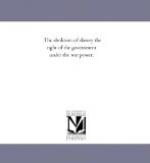“There are, then, Mr. Chairman, in the authority of Congress and of the Executive, two classes of powers, altogether different in their nature, and often incompatible with each other—the war power and the peace power. The peace power is limited by regulations and restricted by provisions prescribed within the Constitution itself. The war power is limited only by the laws and usages of nations. This power is tremendous: it is strictly constitutional, but it breaks down every barrier so anxiously erected for the protection of liberty, of property, and of life. This, sir, is the power which authorizes you to pass the resolution now before you, and, in my opinion, no other.”
After an interruption, Mr. Adams returned to this subject, and went on to say:—
“There are, indeed, powers of peace conferred upon Congress which also come within the scope and jurisdiction of the laws of nations, such as the negotiation of treaties of amity and commerce, the interchange of public ministers and consuls, and all the personal and social intercourse between the individual inhabitants of the United States and foreign nations, and the Indian tribes, which require the interposition of any law. But the powers of war are all regulated by the laws of nations, and are subject to no other limitation...It was upon this principle that I voted against the resolution reported by the slavery committee, ’that Congress possess no constitutional authority to interfere, in any way, with the institution of slavery in any of the States of this Confederacy,’ to which resolution most of those with whom I usually concur, and even my own colleagues in this House, gave their assent. I do not admit that there is, even among the peace powers of Congress, no such authority; but in war, there are many ways by which Congress not only have the authority, but are bound to interfere with the institution of slavery in the states. The existing law prohibiting the importation of slaves into the United States from foreign countries is itself an interference with the institution of slavery in the States. It was so considered by the founders of the Constitution of the United States, in which it was stipulated that Congress should not interfere, in that way, with the institution, prior to the year 1808.




